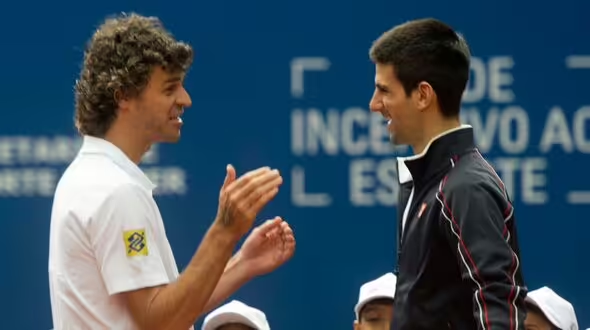
Former triple French Open champion and World No.1 Gustavo Kuerten has listed his best-ever players – and there’s shockingly no room for Novak Djokovic.
Former World No.1 Gustavo Kuerten has not included Novak Djokovic when listing the best tennis players of all time.
The Serbian icon has won a men’s record 24 Grand Slams, which includes a stunning haul of ten Australian Open titles and seven Wimbledon championships. However, three-time French Open champion Kuerten couldn’t make space for the 37-year-old when listing his favourite players in the game’s history.
Between 2000 and 2001, Kuerten, better known as ‘Guga’, led the ATP Rankings after he had clinched the top title at Roland Garros in 1997, 2000, and 2001. The 48-year-old retired in May 2008 and he has now compiled his personal list which includes past and present legends.
Gustavo Kuerten, the former World No.1 and three-time French Open champion, has always had a unique perspective on tennis. His career, marked by artistry and athleticism, has shaped his views on who deserves to be recognized as the greatest in the sport. Recently, Kuerten compiled his personal list of the best tennis players of all time, and his omission of Novak Djokovic has sparked considerable debate among fans and analysts alike.
Born on September 10, 1976, in Florianópolis, Brazil, Kuerten turned professional in 1995. His rise to fame began with his victory at the French Open in 1997, where he became the first Brazilian to win a Grand Slam singles title. He went on to win the tournament again in 2000 and 2001, cementing his legacy as one of the sport’s greats. Known for his elegant playing style and powerful baseline game, Kuerten captured the hearts of tennis fans worldwide.
Kuerten’s time at the top of the sport was characterized by his charisma and sportsmanship, qualities that endeared him to many. His success was not just limited to clay courts; he was a versatile player who could compete at a high level on all surfaces. His career-high ranking of No. 1 came in December 2000, and he remained a significant figure in tennis until his retirement in 2008.
With a career defined by remarkable achievements, Kuerten’s choice to exclude Novak Djokovic from his list has raised eyebrows. Djokovic is not only the current holder of a record 24 Grand Slam titles, but he is also the only male player to have won all nine ATP Masters 1000 events at least twice. His consistency and dominance over the past decade have reshaped the modern tennis landscape, leading many to consider him the greatest of all time.
When asked about his list, Kuerten emphasized the importance of personal connections and the impact players have had on him throughout his career. He cited legends like Rod Laver, Björn Borg, and Pete Sampras as influences who shaped the sport during its formative years. Kuerten’s choices reflect a nostalgic view of tennis, focusing on the players who inspired him rather than solely on statistics.
Kuerten’s approach to defining greatness in tennis raises interesting questions about what truly makes a player the best. Is it the number of titles won, the style of play, or the ability to inspire future generations? For many, including Kuerten, the personal connection to the game and its history holds significant weight.
1. Historical Impact: Players like Rod Laver, who won two calendar-year Grand Slams, are often celebrated for their historical achievements. Kuerten likely feels that these milestones represent a level of excellence that transcends mere numbers.
2. Playing Style: Kuerten, known for his flair and creativity on the court, may also prioritize players who brought unique styles to the game. The artistry displayed by legends like Borg and Sampras could resonate more with him than Djokovic’s modern, data-driven approach.
3. Cultural Influence: The cultural significance of a player can also play a role in their legacy. Kuerten’s Brazilian roots may lead him to appreciate players who have had a profound impact on their countries or regions, further justifying his choices.
The tennis community has been quick to react to Kuerten’s omission of Djokovic. Fans have taken to social media to express their opinions, with many arguing that Djokovic’s achievements are unparalleled and should earn him a place in any discussion of the greatest players.
Analysts have pointed out that Kuerten’s perspective, while valid, might overlook the significance of Djokovic’s contributions to the sport. His resilience, work ethic, and mental fortitude have redefined what it means to be a champion in the modern era. In contrast to the nostalgic lens through which Kuerten views greatness, Djokovic embodies the evolution of tennis, showcasing advancements in fitness, training, and strategy.
As tennis continues to evolve, so too will the criteria for greatness. With younger players like Carlos Alcaraz and Jannik Sinner emerging on the scene, discussions about the greatest of all time will become even more complex. The landscape of tennis is shifting, and with it, the players who are revered as the best.
Kuerten’s list serves as a reminder of the subjective nature of greatness in sports. While statistics and records are important, the personal connections and emotional resonance of a player’s career often shape our perceptions. This nuanced view of greatness is what makes tennis a sport rich with history and passion.
Gustavo Kuerten’s omission of Novak Djokovic from his list of the greatest tennis players may be surprising to many, but it opens up a broader conversation about how we define greatness in sports. As fans, players, and analysts reflect on their personal experiences with the game, it’s clear that greatness can be measured in many ways. Kuerten’s list, filled with legendary names, reminds us of the beauty and complexity of tennis, a sport that continues to inspire and evolve with each passing generation. As the debate over who truly belongs in the pantheon of tennis greats continues, one thing remains certain: the passion and love for the game will always prevail.